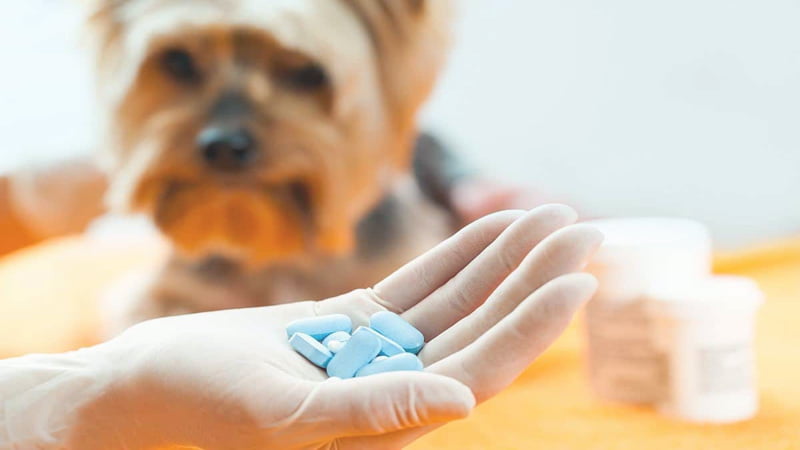Natural Alternatives to Metronidazole for Dogs

Dogs are often susceptible to a variety of gastrointestinal infections. These infections can range from mild to severe and can be caused by several different factors, such as parasites, bacteria, or viruses.
There are a lot of options available to help your dog fight off the symptoms of a bacterial or viral infection. One of the most common options is metronidazole. However, not all dogs are the same, and the drug can have negative side effects on some dogs.
This article will explore some of the natural alternatives your dog can try to combat infection.
What is Metronidazole?

Metronidazole (also sold under brand names Flagyl, Metizol, Metrogel, and Protostat) is a strong antibiotic used primarily to treat diarrhea, along with other diarrhea medicines for dogs. The drug is also used to manage ailments in dogs, cats, and horses as well as to treat bacterial infections in humans. Doctors often prescribe it in conjunction with other antibiotics.
Depending on the illness being treated, metronidazole can be taken orally or applied topically. Veterinarians prescribe metronidazole for their canine and feline patients even though the FDA hasn’t approved it for veterinary use.
What is Metronidazole Prescribed for?
Metronidazole is an effective antibiotic and the primary treatment for infections caused by susceptible anaerobic bacteria, including Bacteroides, clostridium, Coxiella, fusobacterium, peptostreptococcus, peptococcus, and porphyromonas.
The drug works by killing the bacteria that cause infection. It’s commonly used to treat an array of infections in dogs and cats, including skin and joint diseases, bacterial and protozoan infections, and parasites. It can also be used to control fleas.
Metronidazole is sometimes prescribed for other types of infection, such as protozoal infections and trichomoniasis. It can destroy bacteria by interfering with their DNA synthesis.
Because this medicine has a low molecular weight, it absorbs quickly into the body.
Metronidazole Guidelines
Metronidazole is regarded by veterinarians as a safe medication for cats and dogs. But it’s not prescribed for puppies or pregnant females.
Additionally, pets with liver disease, kidney disease, neutropenia, and seizures may suffer adverse effects from the drug.
Pet owners should consult their veterinarian before giving their pets metronidazole. It’s also critical that owners tell their vet if their dog takes any other medications or has any other health condition.
The FDA recommends against the use of metronidazole for treating most bacterial infections in dogs. Owners are therefore advised to follow their veterinarian’s instructions carefully.
Why Vets Use Metronidazole

Mostly due to its versatility when it comes to forms of administration.
Metronidazole comes in capsule, tablet, and liquid form. The drug is also available as metronidazole benzoate, which has a milder flavor than its counterparts and is easier to take.
Metronidazole can also be administered by veterinarians as an injectable, a procedure they will complete in a veterinary hospital or clinic.
Metronidazole Dosage for Dogs
Metronidazole dosage for dogs will depend on its intended long-term use, as well as the dog’s situation. Veterinarians usually administer a dose between 5 mg/lb and 25 mg/lb, which is then administered orally.
Low doses are typically taken twice daily, while high doses are administered once daily. In liquid forms of metronidazole, shake well before administering. Avoid crushing metronidazole tablets since the bitter taste can make swallowing difficult for pets.
To prevent complications, pet owners should follow their veterinarian’s specific dosing instructions on metronidazole.
Side Effects of Metronidazole
According to a 2018 study conducted by the Australian Veterinary Association, metronidazole is neurotoxic for dogs. The effects of this type of toxicity are detrimental to peripheral and central nervous systems.
Canines are rarely affected by neurotoxic effects, but if they do, they may experience paralysis or an allergic reaction.
Dogs may also encounter the following symptoms:
- Appetite loss
- Blood in urine
- Breathing problems
- Diarrhea
- Drooling
- Fatigue
- Fever
- Gagging
- Nausea
Metronidazole overuse can also result in tremors, stiffness, dizziness, and irregular heartbeats in dogs. When any of these occur, your pet should be taken to a veterinarian right away.
Natural Alternatives to Metronidazole
There is a high prevalence of parasitic infections in dogs caused by giardia and trichomonas. Among its clinical symptoms are physical discomfort, vomiting, and bowel infections.
For many veterinarians and owners of small pets, preventing or controlling these diseases can be difficult. Even though veterinary medicine like metronidazole is recommended by doctors, these medicines are not 100% effective as superinfections still occur.
According to a study published in Global Advances in Health and Medicine, it is possible to treat bacterial overgrowth in the gastrointestinal tract with herbal therapy just as effectively as metronidazole. This gives dog owners a wider range of options when it comes to the treatments available for their furry friends.
Metronidazole can be substituted with the following natural alternatives:
Fasting
The idea that fasting is a natural alternative to metronidazole is not new. It has been around for centuries and has been used in different cultures all over the world.
There are many benefits to fasting as an alternative to metronidazole:
- It doesn’t have any side effects.
- It can be done at home.
- It can be done for as long or as short of a time as you want.
- It’s cheaper than metronidazole.
It has been shown that fasting for a few days can cure many conditions that are caused by bacteria, such as stomach ulcers and intestinal infections. This method also helps in restoring their gut flora, which can be negatively affected by the illness.
Fasting for dogs has been around for a long time, but it has recently gained more popularity due to its effectiveness and safety. The process can take up to 12 hours or even more, depending on the severity of the condition that they are suffering from.
Some dogs will fast by themselves. In that case, refrain from offering them food.
Healthy Diet
Metronidazole is an antibiotic that can be used for dogs with gastrointestinal issues. However, it should only be used as a last resort because of the potential risks it poses to your dog’s health.
A healthy diet is a natural alternative to metronidazole for dogs. It’s been shown that a dog’s diet has a significant impact on its health.
Other benefits of a healthy diet include:
- Lower risk of chronic diseases such as diabetes and heart disease.
- Improved skin and coat.
- Increased energy levels.
- Decreased allergic reactions.
A veterinarian can help you make sure your dog is getting all of the nutrients he needs to live a healthy life.
Food Supplements

The use of food supplements is on the rise, especially among pet owners who want to avoid using antibiotics and other drugs. If you prefer not to use synthetic medicine, here are some food supplements you can give to your dog:
Bach Flower Essences
It’s common for dogs to suffer from diarrhea caused by stress. If your pet is suffering from emotional stress, Bach flower remedies (BFRs) may help.
The Bach flower remedy solutions have been used for over a hundred years to treat animals and humans alike. They’re made up of a mixture of distilled water and organic flower petals, which are then preserved in brandy or glycerin.
The essences are classified into 38 groups, each with its unique properties and uses.
Digestive Enzymes
Dogs are not able to produce their digestive enzymes. Therefore, they rely on external sources for this. Digestive enzymes are derived from the pancreas and help break down food into smaller particles. They promote digestion in dogs by decreasing the risk of malabsorption. These enzymes also help with weight management.
To get the most from digestive enzymes, they should be taken with food. They’re available as chewable tablets or capsules and can be bought over-the-counter at many pet stores or online.
L-Glutamine
This amino acid can heal the cells in your dog’s intestines. Give your pet 500 mg each day per 25 pounds of body weight.
L-Glutamine is one of the most common amino acids in the body and is available in many foods. It’s important for many processes in the body, but most notably for healing cells in your dog’s intestines.
Since dogs cannot produce their L-glutamine, they are dependent on supplementation or diet to obtain it. The amino acid can also be found in many foods such as eggs, meat, and dairy products.
Marshmallow Root
The use of herbs like marshmallow root for treating digestive issues is not new. For thousands of years, ancient Egyptians, Greeks, and Romans used it to relieve gas and other stomach ailments.
This herb contains mucilage, which helps soothe the gastrointestinal tract and reduce inflammation.
Marshmallow root can be taken as a tincture or tea. It can also be added to your dog’s food. Give your dog 0.5-1.5 ml of tincture per 20 pounds, 2 to 3 times a day for up to two weeks. You may also give him a supplement that contains marshmallow root.
Slippery Elm
Slippery elm (Ulmus rubra) comes from the red elm tree. It’s considered to be one of the safest and most effective herbs for dogs.
The herb is mostly used to treat diarrhea, colitis, and inflammation. It promotes mucous secretion, which will help soothe your pet’s stomach. For every 10 lbs of body weight, give 1/4 tsp of powder. You can mix the powder with food or yogurt.
Slippery elm can also help the dog rid himself of toxins and impurities. Plus, the herb aids in healing ulcers, repairing damaged mucous membranes, and works as a prebiotic that balances your dog’s gut bacteria.
Homeopathic Solutions
Homeopathic remedies can also be used to treat your dog’s diarrhea. Depending on your dog’s symptoms, you can choose from these options:
- Arsenicum album: This is an ideal remedy if your dog has an upset stomach due to food poisoning.
- China: Give this to your dog if he’s exhausted due to an upset stomach.
- Mercurius solubilis or Mercurius vivus: Use one of these if you notice mucus and blood in your dog’s stool.
- Phosphorous: Give it to your dog if he is suffering from the smelly and bloody stool.
- Sulfur: Give your dog this if he seems hot and you notice he wants to cool off. It reduces overheating and helps cool down hot, itchy skin.
- Strychnine tree (Strychnos nux-vomica): This is an ideal remedy for diarrhea if your dog has eaten too much.
CBD Oil

Cannabidiol (CBD) is considered one of the best natural alternatives to metronidazole for dogs.
CBD is known to have numerous health benefits for humans and pets alike. It’s a non-psychoactive compound that is extracted from the Cannabis sativa plant.
CBD was studied for its antibacterial effects and found to increase the effectiveness of selected antibiotics when used together.
According to Dr. Jerry Klein, the Chief Veterinary Officer of American Kennel Club (AKC), the best quality CBD oil for dogs has anti-inflammatory properties that are tremendously beneficial to dogs.
Cannabinoids are also stated to have strong anti-inflammatory properties and a mechanism of action that helps regulate the immune system, according to a 2010 study.
Although there is evidence to support its use, CBD’s safety has not been fully studied on dogs. Currently, there’s no dosing chart for CBD-based products for pets approved by the FDA.
If you’re considering CBD for your dogs, there are many types of CBD products that your dog will enjoy in addition to the usual CBD oil, including flavored CBD dog treats.
Key Takeaways on Natural Alternatives to Metronidazole
Many people are worried about the side effects of metronidazole, as well as the side effects of antibiotics in general.
From fasting to CBD oil, there are many natural alternatives that you can use in place of metronidazole and the information we provided will be a great starting point for you.
Recent studies have shown that CBD can be a potential alternative to metronidazole for dogs. Pet owners might find its therapeutic properties to be a safer and healthier choice. However, many people still have questions about what it is and how it works.
CBD oil is considered one of the best natural alternatives to metronidazole for dogs because it has been shown to reduce inflammation and pain, as well as inhibit the growth of bacteria that cause infections.
While these claims are possible, pet owners should always consult their veterinarian before making any decisions.
References:
- AKC Staff (2016, January 04). Metronidazole for Dogs. Retrieved from https://www.akc.org/expert-advice/health/metronidazole-for-dogs/.[1]
- Rania Gollakner (2018). Metronidazole. Retrieved from https://vcahospitals.com/know-your-pet/metronidazole.
- Ibid.
- PetMD Editorial (2012, November 07). Metronidazole for Dogs and Cats. Retrieved from https://www.petmd.com/pet-medication/metronidazole.
- Tauro, A., Beltran, E., Cherubini, G. B., Coelho, A. T., Wessmann, A., Driver, C. J., & Rusbridge, C. J. (2018). Metronidazole-induced neurotoxicity in 26 dogs. Australian veterinary journal, 96(12), 495–501. https://doi.org/10.1111/avj.12772[2]
- AKC Staff. op. cit.
- Fiechter, R., Deplazes, P., & Schnyder, M. (2012). Control of Giardia infections with ronidazole and intensive hygiene management in a dog kennel. Veterinary parasitology, 187(1-2), 93–98. https://doi.org/10.1016/j.vetpar.2011.12.023[3]
- Chedid, V., Dhalla, S., Clarke, J. O., Roland, B. C., Dunbar, K. B., Koh, J., Justino, E., Tomakin, E., & Mullin, G. E. (2014). Herbal therapy is equivalent to rifaximin for the treatment of small intestinal bacterial overgrowth. Global advances in health and medicine, 3(3), 16–24. https://doi.org/10.7453/gahmj.2014.019[4]
- Kosgodage, U. S., Matewele, P., Awamaria, B., Kraev, I., Warde, P., Mastroianni, G., Nunn, A. V., Guy, G. W., Bell, J. D., Inal, J. M., & Lange, S. (2019). Cannabidiol Is a Novel Modulator of Bacterial Membrane Vesicles. Frontiers in cellular and infection microbiology, 9, 324. https://doi.org/10.3389/fcimb.2019.00324
- Fiechter, Deplazes, Schnyder. op.cit.
- Pisanti, S., Malfitano, A. M., Ciaglia, E., Lamberti, A., Ranieri, R., Cuomo, G., Abate, M., Faggiana, G., Proto, M. C., Fiore, D., Laezza, C., & Bifulco, M. (2017). Cannabidiol: State of the art and new challenges for therapeutic applications. Pharmacology & therapeutics, 175, 133–150. https://doi.org/10.1016/j.pharmthera.2017.02.041[5]
- Randa Kriss (2019, October 27). CBD Oil for Dogs: What You Need to Know. Retrieved from https://www.akc.org/expert-advice/health/cbd-oil-dogs/.